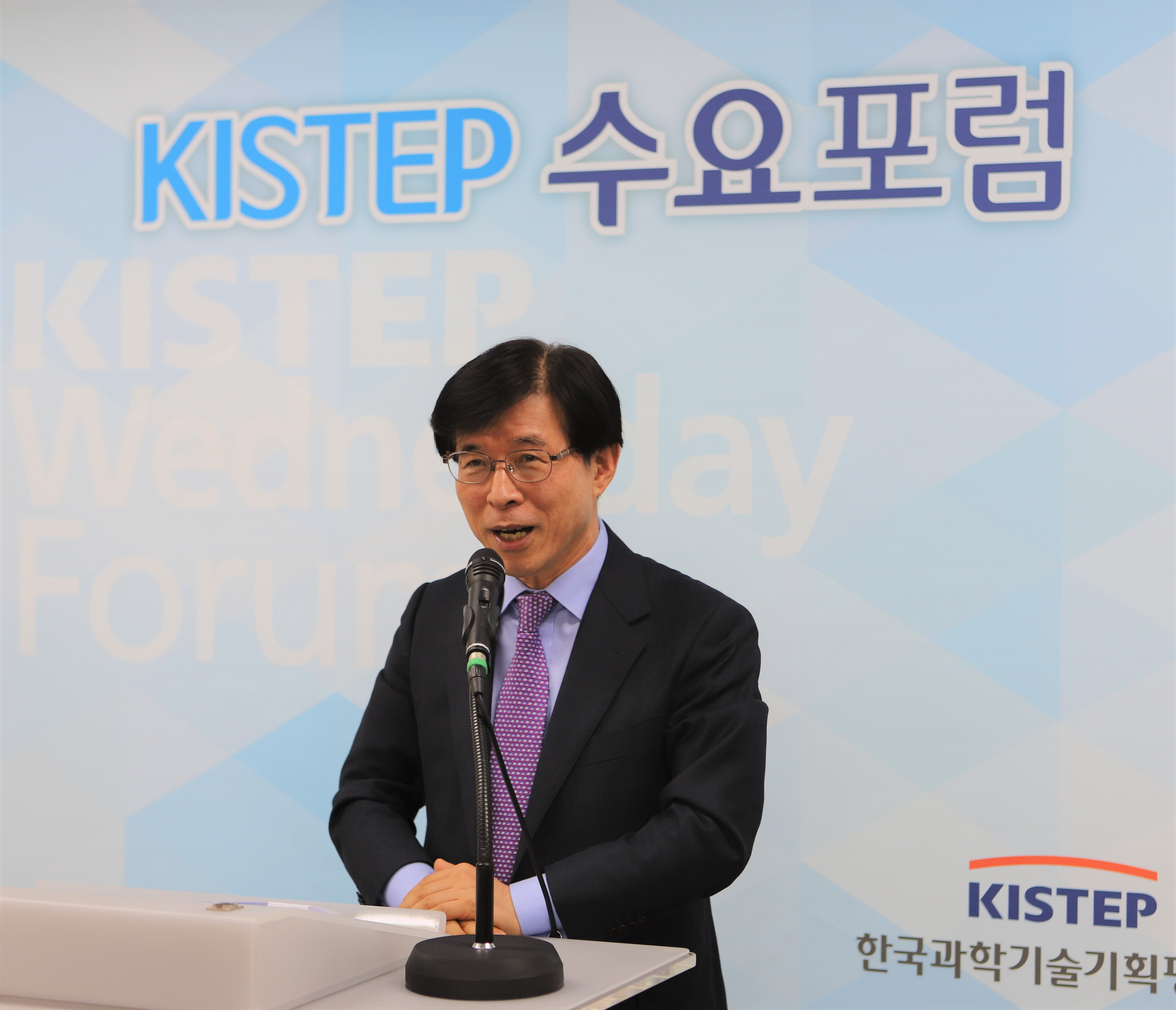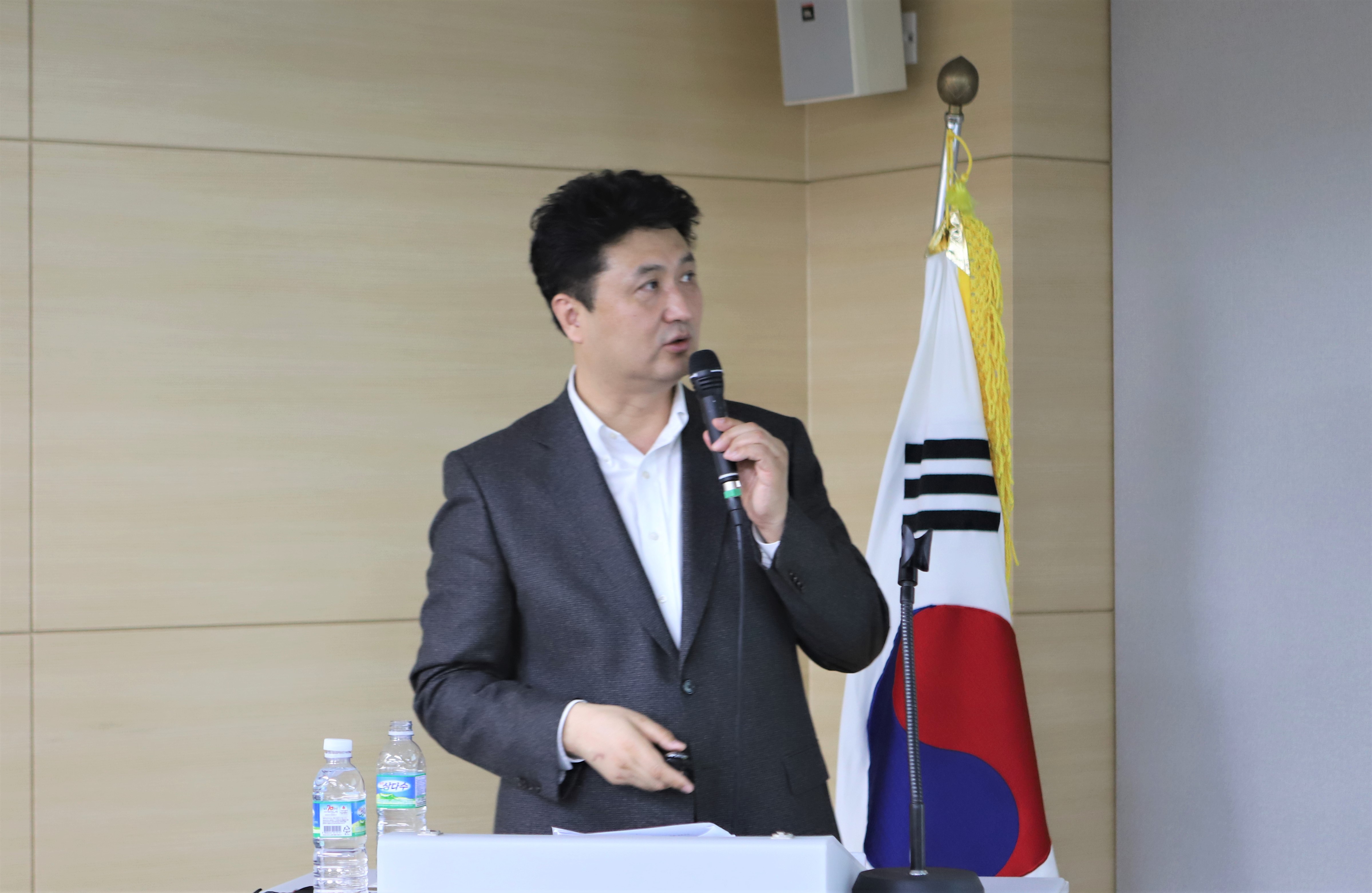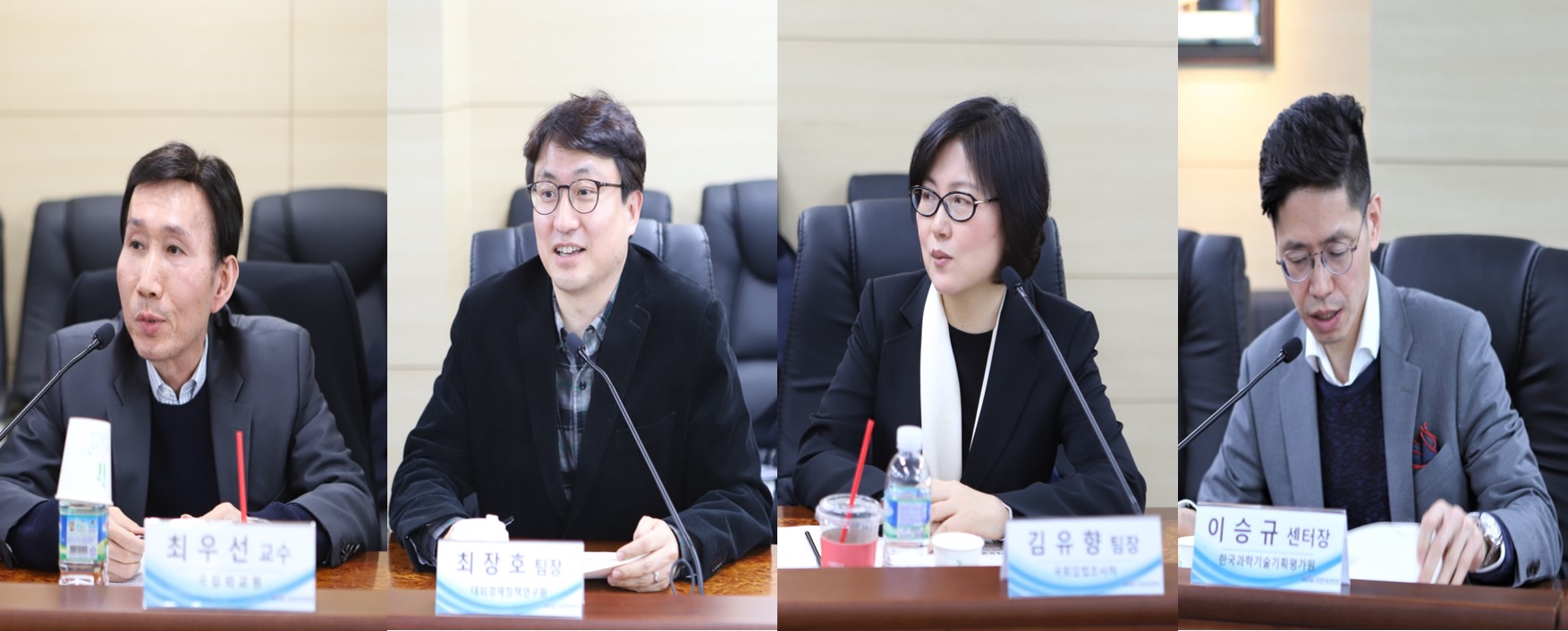News & Event


News & Event
News & Event
[The 99th KISTEP Wednesday Forum] New Horizon of South-North Cooperation
- Writer Kyungran Choi
- Date2019-02-27
- Hit937
File
-
Download
 20190227174231.jpg
(61.26KB / Download 210회)
20190227174231.jpg
(61.26KB / Download 210회)
KISTEP held the 99th KISTEP Wednesday Forum with the theme of ‘New Horizon of South-North Cooperation (focusing on the 4th industrial revolution).’ Recently, Korean Peninsula is rapidly changing with the inter-Korean summit and the 2nd North Korea–United States summit being held. This forum was held to review the status and policy changes in the inter-Korean Science and Technology (S&T) and ICT and emerging security sectors, and explore the strategies and directions for inter-Korean cooperation based on the S&T and ICT, which considered the establishment of an integrated national innovation system (NIS) between inter-Korean.

[▲ Sang-seon Kim (President, KISTEP)]
The forum began with an opening address by Sang-seon Kim (KISTEP), followed by presentation by Sangbae Kim (Professor, Department of political Science and International Relations, Seoul National University). Panel discussion were led by Yoo-Hyang Kim (Director, Science, Media and Telecommunications Team, National Assembly Research Service (NARS)), Woo-Sun Choi (Professor, Department of National Security and Unification Studies, Korea National Diplomatic Academy), Jangho Choi (Head of Team, International Cooperation for Korean Unification, Korea Institute for International Economic Policy (KIEP)) and Seung-Kyu Yi (Director, Center for Social Innovation Policy, KISTEP) and open floor discussion followed the last.
In the presentation, Professor Kim expressed “Expectations for denuclearization and inter-Korean cooperation have been rising since the inter-Korean summit and the 2nd North Korea–United States summit. There will be held a new horizon for inter-Korean cooperation and conflict.” He also explained the expected opportunities and conflict issues in terms of info-communications and emerging security, considering the development of the 4th industrial revolution.

[▲ Sangbae Kim (Professor, Department of political Science and International Relations, Seoul National University)]
He mentioned the South-North Korea cooperation issues such as establishment of road network infrastructure, mobile network, info-communication hardware devices, software, Internet services, and digital media and contents. He also explained the current status of North Korea in relation to those examples and suggested the future direction of South-North cooperation.
He also shared the global emerging security issues of the 4th industrial revolution such as major natural disaster, cyber security, social security of migration and refugees, health security on climate change, and added that we need to review the cases of emerging security on the Korean Peninsula in terms of geopolitics and push for inter-Korean cooperation.
Lastly, he emphasized, "In the current era of the 4th industrial revolution, the government should consider what elements of cooperation and conflict in inter-Korean relations would be in the perspective of complex geopolitics, and take proactive action by setting up the strategy accordingly."

[▲ (from the left) Professor Woo-Sun Choi (Department of National Security and Unification Studies, Korea National Diplomatic Academy), Jangho Choi (Head of Team, International Cooperation for Korean Unification, KIEP), Director Yoo-Hyang Kim (Science, Media and Telecommunications Team, NARS), Director Seung-Kyu Yi (Center for Social Innovation Policy, KISTEP)]
In the panel discussion, Director Yoo-Hyang Kim said, “The problem is that there is not enough data on North Korea's current state of S&T and ICT. We need an accurate research on the situation in North Korea. And it is necessary to resolve legal and political issues for better inter-Korean cooperation relations, including the revision of the Inter-Korean Exchange and Cooperation Act.”
Professor Woo-Sun Choi emphasized, “An objective analysis of the North's industrial development level, manpower level, industrial base and capacity for cooperation should be preceded. It should make a detailed plan for inter-Korean cooperation. Also, starting with manufacturing industries based on the low-wage labor in the North's industrial structure, there should be phased and gradual inter-Korean cooperation into technological cooperation in ICT sector.”
Head of Team Jangho Choi said, “There are many restrictions blocking inter-Korean cooperation. In particular, I believe that the discussion on the integration of technical standards should be held.” He also emphasized the need for legislation on technical exchanges that are not in the Inter-Korean Exchange and Cooperation Act.
“Since inter-Korean cooperation is currently focused on security cooperation, S&T sector is involved as a non-political means, that are far from security sensitivity. When future inter-Korean cooperation has gone to more middle- and long term and specifically related domestic cooperation, S&T should help North Korea to prepare its own innovation system. In addition, NIS on both sides of the border should be linked to create a synergy effect that ultimately results in economic growth, and move in a way that can respond to future social problems," Director Seung-Kyu Yi said.

[▲ Sang-seon Kim (President, KISTEP)]
The forum began with an opening address by Sang-seon Kim (KISTEP), followed by presentation by Sangbae Kim (Professor, Department of political Science and International Relations, Seoul National University). Panel discussion were led by Yoo-Hyang Kim (Director, Science, Media and Telecommunications Team, National Assembly Research Service (NARS)), Woo-Sun Choi (Professor, Department of National Security and Unification Studies, Korea National Diplomatic Academy), Jangho Choi (Head of Team, International Cooperation for Korean Unification, Korea Institute for International Economic Policy (KIEP)) and Seung-Kyu Yi (Director, Center for Social Innovation Policy, KISTEP) and open floor discussion followed the last.
In the presentation, Professor Kim expressed “Expectations for denuclearization and inter-Korean cooperation have been rising since the inter-Korean summit and the 2nd North Korea–United States summit. There will be held a new horizon for inter-Korean cooperation and conflict.” He also explained the expected opportunities and conflict issues in terms of info-communications and emerging security, considering the development of the 4th industrial revolution.

[▲ Sangbae Kim (Professor, Department of political Science and International Relations, Seoul National University)]
He mentioned the South-North Korea cooperation issues such as establishment of road network infrastructure, mobile network, info-communication hardware devices, software, Internet services, and digital media and contents. He also explained the current status of North Korea in relation to those examples and suggested the future direction of South-North cooperation.
He also shared the global emerging security issues of the 4th industrial revolution such as major natural disaster, cyber security, social security of migration and refugees, health security on climate change, and added that we need to review the cases of emerging security on the Korean Peninsula in terms of geopolitics and push for inter-Korean cooperation.
Lastly, he emphasized, "In the current era of the 4th industrial revolution, the government should consider what elements of cooperation and conflict in inter-Korean relations would be in the perspective of complex geopolitics, and take proactive action by setting up the strategy accordingly."

[▲ (from the left) Professor Woo-Sun Choi (Department of National Security and Unification Studies, Korea National Diplomatic Academy), Jangho Choi (Head of Team, International Cooperation for Korean Unification, KIEP), Director Yoo-Hyang Kim (Science, Media and Telecommunications Team, NARS), Director Seung-Kyu Yi (Center for Social Innovation Policy, KISTEP)]
In the panel discussion, Director Yoo-Hyang Kim said, “The problem is that there is not enough data on North Korea's current state of S&T and ICT. We need an accurate research on the situation in North Korea. And it is necessary to resolve legal and political issues for better inter-Korean cooperation relations, including the revision of the Inter-Korean Exchange and Cooperation Act.”
Professor Woo-Sun Choi emphasized, “An objective analysis of the North's industrial development level, manpower level, industrial base and capacity for cooperation should be preceded. It should make a detailed plan for inter-Korean cooperation. Also, starting with manufacturing industries based on the low-wage labor in the North's industrial structure, there should be phased and gradual inter-Korean cooperation into technological cooperation in ICT sector.”
Head of Team Jangho Choi said, “There are many restrictions blocking inter-Korean cooperation. In particular, I believe that the discussion on the integration of technical standards should be held.” He also emphasized the need for legislation on technical exchanges that are not in the Inter-Korean Exchange and Cooperation Act.
“Since inter-Korean cooperation is currently focused on security cooperation, S&T sector is involved as a non-political means, that are far from security sensitivity. When future inter-Korean cooperation has gone to more middle- and long term and specifically related domestic cooperation, S&T should help North Korea to prepare its own innovation system. In addition, NIS on both sides of the border should be linked to create a synergy effect that ultimately results in economic growth, and move in a way that can respond to future social problems," Director Seung-Kyu Yi said.